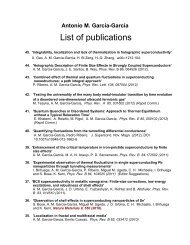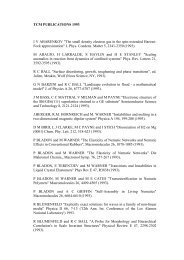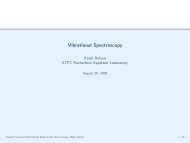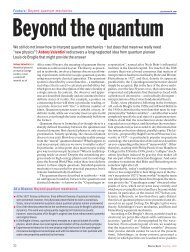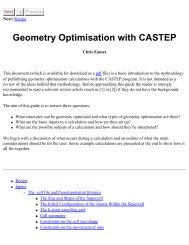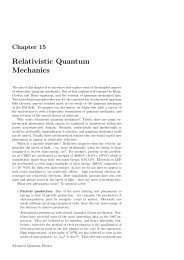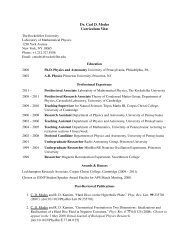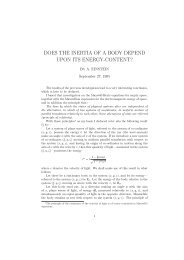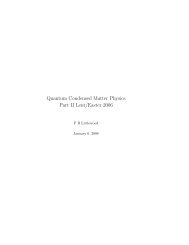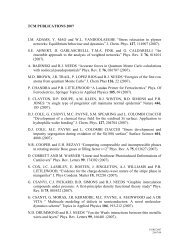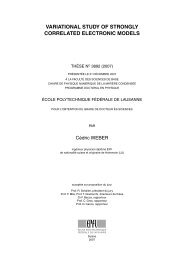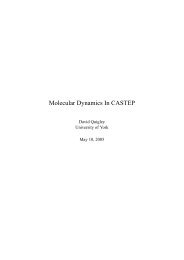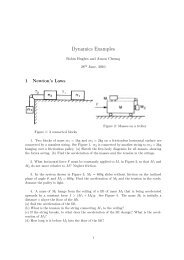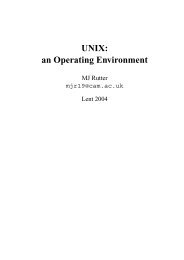CASINO manual - Theory of Condensed Matter
CASINO manual - Theory of Condensed Matter
CASINO manual - Theory of Condensed Matter
You also want an ePaper? Increase the reach of your titles
YUMPU automatically turns print PDFs into web optimized ePapers that Google loves.
• Evidence <strong>of</strong> testing on serial and parallel machines. Remember that in general only the master<br />
processor should write to the output file. Also, casino is supposed to compile and work on<br />
single-processor machines without an installed MPI (Message Passing Interface) library. Use the<br />
fake comms serial.f90 module supplied both in the utils directory and with the main code<br />
(in general you only need worry about this if you introduce a call to an MPI routine which is<br />
not already used in casino and which has not been ‘faked’).<br />
• If you use MPI calls when doing the parallel bits, try to ensure they are included in the MPI-1<br />
standard since, somewhat unbelievably, there are some computers in the world which claim not<br />
to be able to support the 14-year-old MPI-2 standard. Currently, the only MPI-2 routine used<br />
in casino is MPI GATHER IN PLACE, and PLR has implemented a fake version <strong>of</strong> this in the<br />
comms parallel mpi1.f90 routine which can automatically be used on machines which do not<br />
have an MPI-2 installation (if their <strong>CASINO</strong> ARCH file tells them so).<br />
• Your routine uses the standard casino facilities for handling errors (errstop/errwarn etc.).<br />
These can be found in the run control.f90 module.<br />
• Your routine implements something that we desperately want or is in the TODO list.<br />
A.2.2<br />
Bad things<br />
• We do not sacrifice speed for additional functionality. Think <strong>of</strong> another way to write it if it<br />
slows the code down.<br />
• We do not like to include things unless they are completely general. The development <strong>of</strong> general,<br />
complex electronic structure codes can be set back years by people choosing to implement<br />
functionality which works only for their current project. Nongeneral algorithms tend to get<br />
completely thrown away and re-implemented, which wastes the time <strong>of</strong> both parties. It is not<br />
usually much harder to write a general program than it is to write a specific one (we understand<br />
this is not always true!).<br />
• You should not use any calls to external libraries apart from MPI, BLAS and LAPACK.<br />
• When writing to the output file, the new routines should not write out lots <strong>of</strong> weird arrays<br />
(whose meaning is understood only by the author) in an incredibly scruffy format full <strong>of</strong> spelling<br />
mistakes. In general, be as beautiful and informative as you can when writing to output, or<br />
MDT will just have to make it so (which takes ages). If there are all sorts <strong>of</strong> special cases<br />
which require different output, then so be it—select case and if blocks are very useful in this<br />
regard.<br />
• Prior agreement for modification <strong>of</strong> the code should have been obtained. Unsolicited submissions<br />
are not accepted and can lead to moody lack <strong>of</strong> cooperation on our part.<br />
A.3 Testing and debugging <strong>CASINO</strong><br />
Here is some advice on how to go about testing and debugging casino after you have made some<br />
modifications.<br />
• Type make debug in ~/<strong>CASINO</strong>/src/ in order to compile the code with debugging options set.<br />
The resulting binary can be run by the runscript using runqmc −−debug or runqmc −d.<br />
• The best compilers for debugging on PCs are, in order <strong>of</strong> decreasing preference: NAG, G95 (now<br />
deprecated), GCC, PathScale, Intel. MDT has recently discovered that the Cray compiler is<br />
pretty good too.<br />
• It is a good idea to try running the code using several different compilers on several different<br />
architectures: this maximizes the chance <strong>of</strong> finding problems. There are bugs which require<br />
a combination <strong>of</strong> compilers to locate successfully. Note that you should always test that your<br />
modifications work on parallel computers, if possible.<br />
• If you encounter a problem, try changing options in the input file before looking in the code.<br />
For example, does the problem only occur when a Jastrow factor is used? Does it only occur<br />
when the cusp correction is used? Try to obtain the simplest set <strong>of</strong> circumstances capable <strong>of</strong><br />
reproducing the problem.<br />
215



